Date: Aug 16, 2008 6:50 PM
----------------- Original Message -----------------
From: Eddie NWO Censored

Key to life: Bees pollinate our crops and without them we'd have seriously limited food supplies
*********************************************************************************
As mystery plague threatens to wipe out bees, scientist reveal: our survival depends on them
*********************************************************************************
Daily Mail UK
By Alison Bejamin and Brian Mccallum
Last updated at 5:26 PM on 25th June 2008
http://www. dailymail. co. uk/sciencetech/article-1028560/As-myster...
The mountains of southern Sichuan in China are covered in pear trees
Every April, they are home to a strange sight: thousands of people holding bamboo sticks with chicken feathers attached to the end, clambering among the blossom-laden branches
Closer inspection reveals that children, parents and even grandparents are pollinating the trees by hand
It is a ritual they have been following for more than 20 years, ever since pesticides killed their honey bees
It’s a tough job.The farmers must first collect pollen from the blossoms by scrubbing it off the anthers (the male part of the flowers) into a bowl
They let it dry for two days, then the whole family come out with their homemade feather dusters, which are dipped in the pollen and applied to the flowers’ stigmas (the female parts)
It is a slow, laborious process and much less efficient than a colony of honeybees, which could visit three million flowers in a day
But the hand pollination seems to work.In August, the trees are heavy with fruit and each family harvests around 11,000lb of pears
Impossible to imagine such scenes in Britain, isn’t it? Well, don’t be so sure
Some experts fear this extraordinary ritual may have to be repeated across the world — because the honeybee population is declining at a truly alarming rate
So far, a third of all honeybees in America have died and the honeybee population in Europe has been devastated
Sixty years ago, in England and Wales, there were more than 360,000 hives; now there are just 270,000 across the whole of Britain
But most perplexing of all is that no one knows why this is happening — and what to do about it.Adult bees have been leaving their hives and not returning, leaving their queen, eggs and larvae to starve to death
This phenomenon has a suitably modern name — Colony Collapse Disorder (CCD) — and theories as to what causes it range from mobile phones interfering with the bees’ navigation systems to pesticide poisoning and exposure to GM crops
More than a year after scientists began investigating, they are still only following vague leads
In Britain, the Government denies that CCD has reached our shores and, instead, attributes the heavy loses to varroa mites — the deadly parasites that have been massacring Europe’s bees since 1992
Like something out of a horror movie, these blood- sucking mites hitch a ride into hives on the backs of unsuspecting bees
Once inside, the female mites bury themselves at the bottom of the brood cells, feed on the larvae and lay their eggs.These hatch and mate and continue the cycle

Hive: In the UK alone the honeybee population has fallen from 360,000 to 270,000 in 60 years Other parts of the world are far worse hit
But the bees that grow from larvae and are attacked by mites have a shorter lifespan, as well as shrunken and deformed wings, and are less resistant to infection.Eventually, the population is wiped out
But there are other factors at play, too.Changes in agricultural practices mean huge areas of land have been planted with a single crop, and the removal of hedgerows and field margins has robbed wild honeybees of places to nest
Meanwhile, the abandonment of crop rotation in favour of fertilisers, and the elimination of weeds in these huge fields and pastures, have contributed to a dearth of food for them
Excessive mowing of embankments, roadsides and public areas also leads to loss of flowers and nesting sites
So could buzzing on a summer’s day really become a distant memory? Some experts fear the honeybee could be extinct in fewer than 30 years — with catastrophic results
It is hard to grasp the full horror that would ensue if honeybees did vanish.Most people’s initial response to the idea of a world without bees is ‘That’s a shame — I’ll have no honey to spread on my toast’ or: ‘Good — one bug fewer that can sting me’
Yet without the insect that pollinates many of the plants we rely on for food, beekeepers warn of an economic and ecological disaster
Read The Rest HERE
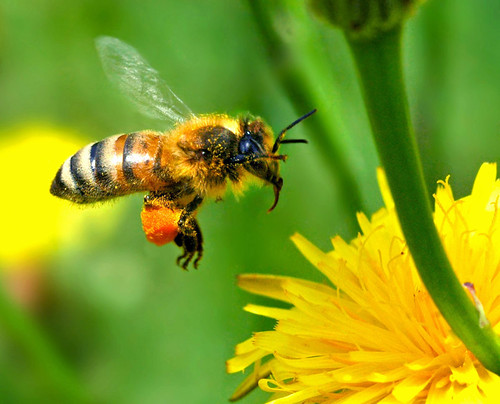
Honeybee Colony Collapse to Devastate Food Companies, Result in Food Scarcity
Natural News
Monday, May 12, 2008
by: Mike Adams (see all articles by this author) | Key concepts: honeybees, colony collapse disorder and nature
http://www. naturalnews. com/023224. html
(NaturalNews) The ongoing phenomenon of mysterious honeybee deaths is starting to raise alarm in the food industry, which depends heavily on bees to pollinate many critical crops "Honeybee health and sustainable pollination is a major issue facing American agriculture that is threatening our food supply and endangering our natural environment," said Diana Cox-Foster of Penn State
I tend to think that honeybees are simply "on strike" They're tired of being slave workers for the very humans who continue to destroy their habitat, pollute their air and water, and steal the labors of their hard work (honey, bee pollen and free pollination services)
Honeybees pollinate 130 different crops, which supply $15 billion worth of food and ingredients each year One out of every three bites of food on your dinner plate was made possible by honeybee pollination
The Emergence of Colony Collapse Disorder
In late 2006, beekeepers in the United States began to notice that unusual numbers of honeybees were dying during the winter Beekeepers reported losing between 30 and 90 percent of their bees, in contrast to the usual 20 to 25 percent
The phenomenon, which continued through last winter, remains unexplained. Some of the potential reasons being investigated for the honeybee die-off are poor nutrition, invasive mites, diseases or toxins, air pollution, or a mysterious phenomenon known as colony collapse disorder, in which bees abruptly desert their hives and die (i.e.they go on strike) In general, human beings have a very poor appreciation of all the services "provided" by Mother Nature, including the removal of CO2 from the air by plants, the turning of soil by worms, and of course the free pollination of crops and orchards by honeybees and other insects
While the U.S.Department of Agriculture's Agricultural Research Service (ARS) and a number of institutions are currently researching the causes of the die-off, the food industry is now entering the fray International ice-cream giant Haagen-Dazs has announced a new program to fund and encourage research into the problem, with the hopes of staving off a crisis for its own business
"Haagen-Dazs ice cream is made from the finest all-natural ingredients, and the plight of the honeybee could mean many of the ingredients used in our top flavors, like Vanilla Swiss Almond and Strawberry, would be difficult to source," said Haagen-Dazs brand manager Josh Gellert
Nearly 40 percent of Haagen-Dazs' ice cream flavors include bee-dependent ingredients. "These are among consumers' favorite flavors," brand director Katty Pien said."We use 100 percent all-natural ingredients like strawberries, raspberries and almonds which we get from California The bee problem could badly hurt supply"
The "Haagen-Dazs Loves Honeybees" (HD loves HB) campaign includes the creation of a board of bee scientists to help guide research into the problem, a $150,000 grant to honeybee-related programs at Penn State's College of Agricultural Sciences and a $100,000 grant to the Harry H Laidlaw Jr Honeybee Research Facility at the University of California-Davis
"Honeybees are in trouble," said Walter Leal, professor chair of the UC-Davis Entomology Department."One-third of our nation's food supply depends on bee pollination, but bees are vanishing in massive numbers This gift will help us to rebuild and revitalize our honeybee program"
The Laidlaw program suffered greatly from budget cuts and faculty retirements during the 1990s, before colony collapse emerged as a problem The Haagen-Dazs grant will go toward a postdoctoral researcher's salary and toward funding research into colony collapse disorder and sustainable pollination
At Penn State, the grant money will help purchase equipment that will be used to analyze samples and more effectively detect and identify viruses, pesticides and other potentially harmful substances It will also fund small student research grants
Beyond ice cream: The coming era of food scarcity
Of course, the honeybees-on-strike problem goes way beyond ice cream. We're talking about one-third of the human food supply here. If honeybees stop doing all the free work they've been doing to pollinate crops, humans are going to find themselves in very difficult situation regarding global food supplies.A global famine is not out of the question here, especially when you combine the loss of honeybee populations with the situation of rapidly deteriorating soil quality across the world's farmlands Without usable soils and willing insect pollinators, humans will quickly find themselves chewing on their shoelaces, wishing they could bring back the "good days" when honeybees freely volunteered to work, and farm soils actually contained nutrients
In my view, the collapse of honeybee populations is just one sign of many that humans have pushed Earth's ecosystems over the edge. We've polluted the skies, the land and the waters. We've raped the planet of its minerals, slashed and burned its rainforests, depleted its soils and devastated its wild animal population. We've dumped chemicals, radioactive waste and endless mountains of trash into the oceans and waterways.And then we balk when nature hiccups We scratch our heads, wondering why some element in nature that we've exploited for so long suddenly stops behaving in the way we want Why are the ocean fish populations collapsing? Why are our food crops nutritionally depleted? Why are infectious diseases now threatening to unleash a new pandemic? Why are honeybees going on strike?
The answer, of course, is because humans have turned planet Earth into a toxic world. We've poisoned the one thing in the universe that openly and unselfishly offered to give us so much for free.Yet instead of appreciating Mother Nature, we've chosen to betray her We've turned what was once an Eden into a toxic world, and it's only a matter of time before the destabilizing, harmful practices we've adopted to feed an expanding human population come back to haunt us in a devastating way
There is a tipping point where Mother Nature will simply refuse to cooperate, and this honeybee collapse is one sign that we may have already crossed a threshold, beyond which balance will only be achieved by a sharp decline in the human population
Not coincidentally, the loss of food pollinators will cause precisely that. As I've said many times before on NaturalNews, eventually humans will live in balance with nature. The question is whether we will consciously create that balance as a mature species, or if we will be starved into submission by a global ecosystem that refuses to support such a large population of human beings.One thing for sure: The problem of rampant obesity is about to come to an end A few years from now, the very idea that half the people in any nation could feed themselves into a state of extreme obesity will be considered outlandish
The alarm bells are ringing, folks. We have reached the limit of the planet's ability to absorb our pollution and environmental devastation. I sadly predict the human species if not mature enough to make the necessary forward-thinking changes, and that it will only learn from disaster. That disaster is coming.Prepare to live in a world where food becomes desperately scarce Prepare to see the human population collapse in almost precisely the same way the honeybee populations are collapsing
As go the insects, so go humans
###
About the author: Mike Adams is a consumer health advocate with a passion for sharing empowering information to help improve personal and planetary health He has authored and published thousands of articles, interviews, consumers guides, and books on topics like health and the environment, reaching millions of readers with information that is saving lives and improving personal health around the world. Adams is an independent journalist with strong ethics who does not get paid to write articles about any product or company. In 2007, Adams launched EcoLEDs, a maker of super bright LED light bulbs that are 1000% more energy efficient than incandescent lights. He's also the CEO of a highly successful email newsletter software company that develops software used to send permission email campaigns to subscribers.Adams is currently the executive director of the Consumer Wellness Center, a 501(c)3 non-profit, and enjoys outdoor activities, nature photography, Pilates and adult gymnastics
Known by his callsign, the 'Health Ranger,' Adams posts his missions statements, health statistics and health photos at www. HealthRanger. org
*********************************************************
Honey Bees are the foundational, keystone pollinator specie of modern production agriculture - Albert Einstein was quoted as saying, “If the honey bee becomes extinct, mankind will follow within four years” Whether this is true or not, if the bees continue to disappear, mass starvation will only become a reality as global food supply is now already in a serious crisis
Beeings being wiped out - News
Are cellphones killing honey bees?
Honey bees going extinct
Honey bees in US facing extinction – Telegraph UK 14/03/2007
*******************************************************************
Survey shows US honey bee deaths increased over last year
*******************************************************************
Associated Press
By JULIANA BARBASSA, Associated Press Writer
Wed May 7, 7:08 AM ET
http://news. yahoo. com/s/ap/20080507/ap_on_re_us/disappearing_bees
SAN FRANCISCO - A survey of bee health released Tuesday revealed a grim picture, with 361 percent of the nation's commercially managed hives lost since last year
Last year's survey commissioned by the Apiary Inspectors of America found losses of about 32 percent
As beekeepers travel with their hives this spring to pollinate crops around the country, it's clear the insects are buckling under the weight of new diseases, pesticide drift and old enemies like the parasitic varroa mite, said Dennis vanEngelsdorp, president of the group
This is the second year the association has measured colony deaths across the country This means there aren't enough numbers to show a trend, but clearly bees are dying at unsustainable levels and the situation is not improving, said vanEngelsdorp, also a bee expert with the Pennsylvania Department of Agriculture
"For two years in a row, we've sustained a substantial loss," he said."That's an astonishing number Imagine if one out of every three cows, or one out of every three chickens, were dying That would raise a lot of alarm"
The survey included 327 operators who account for 19 percent of the country's approximately 244 million commercially managed bee hives The data is being prepared for submission to a journal
About 29 percent of the deaths were due to Colony Collapse Disorder, a mysterious disease that causes adult bees to abandon their hives Beekeepers who saw CCD in their hives were much more likely to have major losses than those who didn't
"What's frightening about CCD is that it's not predictable or understood," vanEngelsdorp said
On Tuesday, Pennsylvania's Agriculture Secretary Dennis Wolff announced that the state would pour an additional $20,400 into research at Pennsylvania State University looking for the causes of CCD This raises emergency funds dedicated to investigating the disease to $86,000
The issue also has attracted federal grants and funding from companies that depend on honey bees, including ice-cream maker Haagen-Dazs
Because the berries, fruits and nuts that give about 28 of Haagen-Daazs' varieties flavor depend on honey bees for pollination, the company is donating up to $250,000 to CCD and sustainable pollination research at Penn State and the University of California, Davis
********************************************************************************
Death of the Bees: GMO Crops and the Decline of Bee Colonies in North America
********************************************************************************
Global Research
March 25, 2008
by Brit Amos
http://globalresearch. ca/index. php?context=va&aid=8436
‘Commercial beehives pollinate over a third of [North}America’s crops and that web of nourishment encompasses everything from fruits like peaches, apples, cherries, strawberries and more, to nuts like California almonds, 90 percent of which are helped along by the honeybees Without this pollination, you could kiss those crops goodbye, to say nothing of the honey bees produce or the flowers they also fertilize’1
This essay will discuss the arguments and seriousness pertaining to the massive deaths and the decline of Bee colonies in North America As well, it will shed light on a worldwide hunger issue that will have an economical and ecological impact in the very near future
There are many reasons given to the decline in Bees, but one argument that matters most is the use of Genetically Modified Organisms (GMO) and "Terminator Seeds" that are presently being endorsed by governments and forcefully utilized as our primary agricultural needs of survival I will argue what is publicized and covered by the media is in actuality masking the real forces at work, namely the impact of genetically modified seeds on the reproduction of bee colonies across North America
Genetically modified seeds are produced and distributed by powerful biotech conglomerates The latter manipulate government agricultural policy with a view to supporting their agenda of dominance in the agricultural industry American conglomerates such as Monsanto, Pioneer Hybrid and others, have created seeds that reproduce only under certain conditions, often linked to the use of their own brands of fertilizer and/or insecticide
The genetic modification of the plant leads to the concurrent genetic modification of the flower pollen When the flower pollen becomes genetically modified or sterile, the bees will potentially go malnourished and die of illness due to the lack of nutrients and the interruption of the digestive capacity of what they feed on through the summer and over the winter hibernation process
I will argue that the media reports tend to distract public opinion from the true cause which underlies the destruction of bee colonies As such, outlined are four major arguments which the biotech conglomerates (which produce and market GMO seeds) have used to mislead the public regarding the demise of the bees These arguments include Varroa mites, parasites, cell phones, and terminator seeds
Argument 1: Varroa mites2
Firstly, “while there are some [people who] want to pin the blame on these mites”3, such views are unconvincing in that the argument does not make any sense because the main source of disease for these bees is intestinal disease. In fact, “many bee experts assumed Varroa mites were a major cause of the severe die-off in the winter of 2005. Yet when researchers from the U.S. Department of Agriculture (USDA) Bee Research Laboratory in Beltsville, Maryland, traveled to Oakdale, California, where Anderson and a number of his fellow beekeepers spend winter and spring, they could find no correlation between the level of Varroa mite infestation and the health of bee colonies. ‘We couldn’t pin the blame for the die-off on any single cause,’ says Jeff Pettis, a research entomologist from the U.S. Department of Agriculture (USDA) Bee Research Laboratory in Beltsville, Maryland,4 However, treatments against mites may be leaving hives open to the onslaught of powerful pathogens, much in the same way the overuse of antibiotics lead to super bugs”5 in society today.What does that say about our future? We have learned that in the 1960’s and 1970’s, among other human ailments, DDT was a major cause of cancer in humans and animals; however, the substitution of such pesticides was a closely guarded secret Unfortunately, the long term effects on the human population has yet to be understood as the compromise of the immune system may be happening quicker than we are ready to accept, even regarding the advent of super bugs One can see that even this medical implication has severe economical implications
Argument 2: Parasites
Secondly; “Crops and even hedges, verges, and woodlands, and even where bees remain are sprayed with pesticides or herbicides. These chemicals are the practical extension of an exasperating belief that nature is our enemy. Pouring poison on our food is a very simplistic way of dealing with our problems however it ignores the root causes. New genetically modified crops, designed to be immune to certain pesticides and herbicides, have resulted in the increased usage of these chemicals.Pesticides, particularly Bayer’s imidacloprid, a nicotine-based product marketed under the names Admire, Provado, Merit, Marathon, and Gaucho have been concretely implicated6 in the destruction of bee populations before (See also)7 The fact that other bees and insects are not raiding deserted hives to feed on the honey as they normally would lends some credence to the theory of a toxic overload”8 The toxic overload is certainly a concern, but wouldn’t it also need to be considered that this is systematic in the degeneration of the digestive process, such as in humans’ inability to digest preservatives and not absorb the enzymes to break down the foods eaten for survival?
Argument 3: cell phones
Thirdly, “there was also a misconstrued study on cell phone radiation 9 and its effects on the bee’s ability to navigate which turned out to be an over-zealous unthinking reaction by an article in the Independent [news] Some have also mentioned other navigational hindrances such as UV radiation, shifting magnetic fields and even quantum physics10 as a reason to the destruction of the bees”11
There is certain implications to this theory, and it has been proven that electromagnetic radio wave lengths to affect the navigation of the bees However the sun emits radiation spurts all the time, yet this has not offered a hindrance to the bees
Argument 4: Terminator Seeds
Lastly, “leaked documents seen by the Guardian show that Canada wants all governments to accept the testing and commercialization of “Terminator” crop varieties. These seeds are genetically engineered to produce only infertile seeds, which farmers cannot replant, also to mention that the bees that are trying to collect pollen, found to have their digestive tract diseases, such as amoeba and nosema disease”12.These diseases are mainly located in the digestive tract system After studies of the autopsy, the most alarming trait is that the lower intestine and stinger have discolored to black vs the normal opaque color, Synominus with colon cancer in humans
Figure 1: Extreme discoloration of intestinal tracts of bees
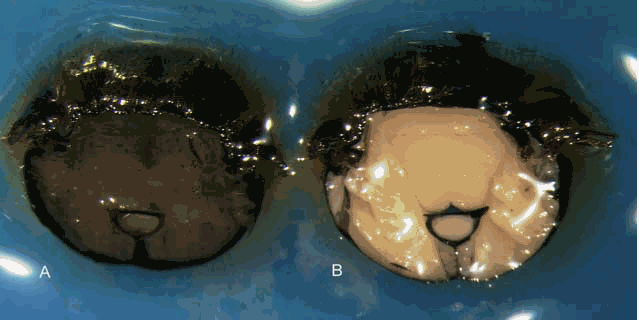
‘When thoracic discs were cut from sample Georgia A-2 the musculature of bees was notably soft and discolored (A) when compared to healthy thoracic cuts (B)
This discoloration suggests that the bees were dead upon collection When questioned the beekeeper confirmed that the bees were alive at the time of collection Further, the tracheal system of these bees did not show signs of desiccation usually associated
with the collection of dead bees Thoracic discs from this sample, after being placed in KOH for 24 hours, revealed peculiar white nodules”13
As seen above, it is certain that the digestive shutdown is due to hard material in the digestive tract that compromises the immune system Circulatory problems would without doubt Could it be that humans are going through the same process with the rise of Colon Cancer? As seen below in the comparison of the healthy Bee and the unhealthy bee, it is obvious that the bees that are ingesting GMO pollen are having severe digestive problems, so severe that the disease is terminal
Figure 2: Digestive shutdown of the Honey Bee
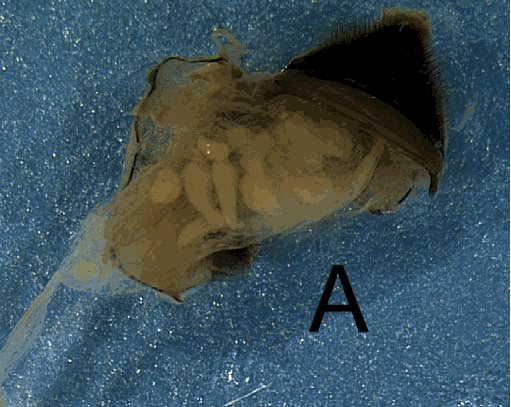
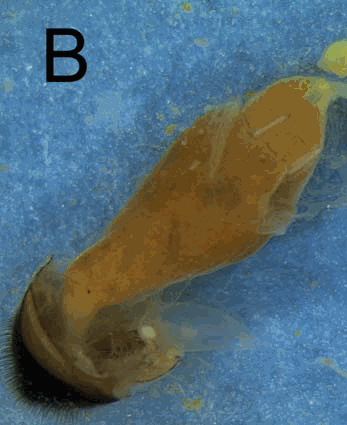
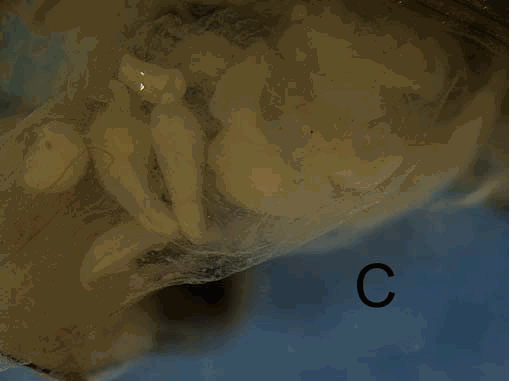
The rectal contents of Georgia bees (A) were distinctly different then the contents of Pasadena bees (B). The rectal walls of GA bees were notably transparent revealing contents that looked like small stone packets (C). While Fyg (1964) describes similar stone like contents in poorly laying queens, the stones observed in the GA bees were not attached to the epithelium layer as Fyg (1964) describes. When these packets were ground and mounted, some unidentified floating objects (UFO’s) were observed. A cubic particle that resembles the cubic bodies of polyhedrios viruses (this viruses attacks wax moths) excepting that the cube observed was ~10x too big for a virus particle.There were fragments of pollen grains husks in all samples examined All PA samples were found to have nosema spores in their rectal contents while none of the GA samples did In two samples, epithelial cells were packed with spores14
The North American reliance on bees for pollination is at minimum from 30 to 40%. Does it not seem obvious that the digestion of genetic material directly affects the digestive process of the bees? Could it also be that there are similarities in the human population's digestive process? It must also be noted that this increased epidemic of the bee colony collapse has risen significantly since the use of GMO in our foods. It is also suspect in the rise of new cases of medical ailments in humans such as colon cancer, obesity, heart disease, etc... In the writers’ opinion, the inability of the bees to pass matter digestively is quite similar to the present-day problems in the human digestive system
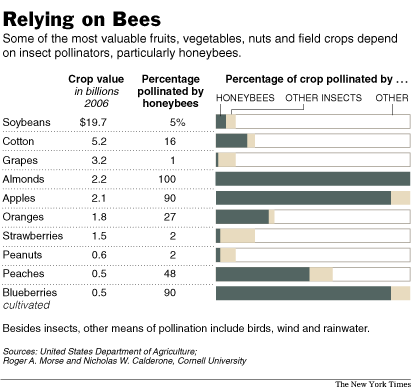
Conclusion:
The proof is obvious that one of the major reasons of the bees’ decline is by the ingestion of GMO proteins. This is problematic, as there is such an increase of indigestible foods in humans and bees. The situation of colon cancer in humans is somewhat similar in occurrence.This is only a theory but leaves one to wonder what are we eating en mass The external or complementary good of the bee is obviously a rise for a global concern The long-term economical and environmental impact has yet to be completely understood
The Ecological Impact of horizontal gene transfer and increase of rampant disease is not fully examined and if so, is kept silent by these Conglomerates The Economic impact of the bee colony collapse would mean inflation, scarcity of agricultural commodities, and ultimately the collapse of North American agriculture
The Environmental Impact of scarcity and increased demand for resources, will beyond doubt have severe repercussions for our long-term food security The bio-diversity of the bees causes positive economic and ecological externalities The negative externalities have yet to be fully grasped or understood
Organic crops: still relatively untouched
The truth is that organic farming is relatively untouched as the bee crisis is concerned.Organic farming maintains the diversity of the eco-system and preserves the quality of the foods produced The economic impact that the scarcity of bees will potentially have on our society as a whole is very worrisome In the end, only our children will fully realize; that it was greed that destroyed our beautiful blue planet
References:
Thill, John Colony Collapse: Do Massive Bee Die-Off Mean an End to Our Food System as We Know it? AlterNet
http://www. alternet. org/module (Accessed 7/9/2007 10:06 PM)
Colony Collapse Disorder: Wikkapedia Encyclopedia Online
http://en. wikipedia. org/wiki/’Colony Collapse Disorder’
(Accessed July 12, 2007)
Colony Collapse Disorder (CCD)
www. ento. psu. edu/MAAREC/pressReleases/FallDwindleUpdate0107. pdf
(Accessed June 30, 2007)
CROP PROTECTION Monthly 28 February 2001 – Issue No 135
Market Scope Europe Ltd
http://www. crop-protection-monthly. co. uk (Accessed July 10, 2007)
HONEY BEE Research Program RIRDIC Honeybee Research Program Home Page
http://rirdic
gov. au/program/hb. html#top, (Accessed July 7, 2007)
Ho, Dr Mae-Wan ‘Recent Evidence Confirms Risks of Horizontal Gene Transfer’ ISIS Contribution to ACNFP/Food Standards Agency Open Meeting 13 November 2002, Institute of Science in Society, PO Box 32097, London NW1 0XR (Accessed July 16, 2007)
ISIS Contribution ‘Recent Evidence Confirms Risks of Horizontal Gene Transfer” ISIS Contribution to ACNFP/Food Standards Agency Open Meeting 13 November 2002 (Accessed July 17, 2007)
Mackintosh, Craig (April 13, 2007): ‘Colony Collapse Disorder– a moment of reflection’;
http://www. celsias. com/2007/04/13/colony-collapse-disorder-a-mome... (Accessed July, 2007)
Vidal, John ‘Canada backs terminator seeds’, The Guardian Wednesday, February 9, 2005
http://www. guardian. co. uk/gmdebate/Story/ (Accessed July 17, 2007)
Wilson, Dan Lost colonies: ‘Where have the bees gone’? Appelton Post-Crescent, 5/18/2007 (Accessed July 19, 2007)
What’s Causing the Mass Disappearance of Honeybees? ‘What is causing the Dramatic decline in Honeybee Populations in the U
S and Elsewhere in Recent years’? HealthNewsDigest. com – New York, NY, June 2, 2007
http:/www. emagazine. com/earthtalk/archives. php (Accessed July 10, 2007)
Notes
1 Hill, Scott AlterNet, Posted on June 11, 2007, Printed on July 9, 2007
http://www. alternet. org/story/53491/
2 http://www. nrdc. org/onearth/06sum/bees2. asp
3 Mackintosh, Craig (April 13, 2007): ‘Colony Collapse Disorder– a moment of reflection’; Celsias;
http://www. celsias. com/2007/04/13/colony-collapse-disorder-a-mome... ‘
4 ‘The Vanishing’
http://www. nrdc. org/OnEarth/06sum/bees1. asp
5 Mackintosh, Craig (April 13, 2007): ‘Colony Collapse Disorder– a moment of reflection’; Celsias;
http://www. celsias. com/2007/04/13/colony-collapse-disorder-a-mome... ‘
6 http://www. valleyvoicenewspaper. com/vv/stories/beedeaths. htm
7 http://independent. co. uk/environment/news/article2449968
8 Mackintosh, Craig (April 13, 2007): ‘Colony Collapse Disorder– a moment of reflection’; Celsias;
http://www. celsias. com/2007/04/13/colony-collapse-disorder-a-mome...
9 http://www. newmediaexplorer. org/sepp/2003/11/26/millions_of_bees_...
10 http://www. synchronizm. com/blog/index. php/2007/03/29/the-bees-wh...
11 Mackintosh, Craig (April 13, 2007): ‘Colony Collapse Disorder– a moment of reflection’; Celsias;
http://www. celsias. com/2007/04/13/colony-collapse-disorder-a-mome...
12 Vidal, John ‘Canada backs terminator seeds’ Wednesday February 9, 2005 The Guardian
http://www. guardian. co. uk/gmdebate/Story/
13 Fall Dwindle Disease: A preliminary report
http://www. ento. psu. edu/MAAREC/pressReleases/FallDwindleUpdate01...
December 15, 2006
14 Fall Dwindle Disease: A preliminary report
http://www. ento. psu. edu/MAAREC/pressReleases/FallDwindleUpdate01...
December 15, 2006
Global Research Articles by Brit Amos
© 2025 Created by James and Terry Hamilton.
Powered by
![]()
